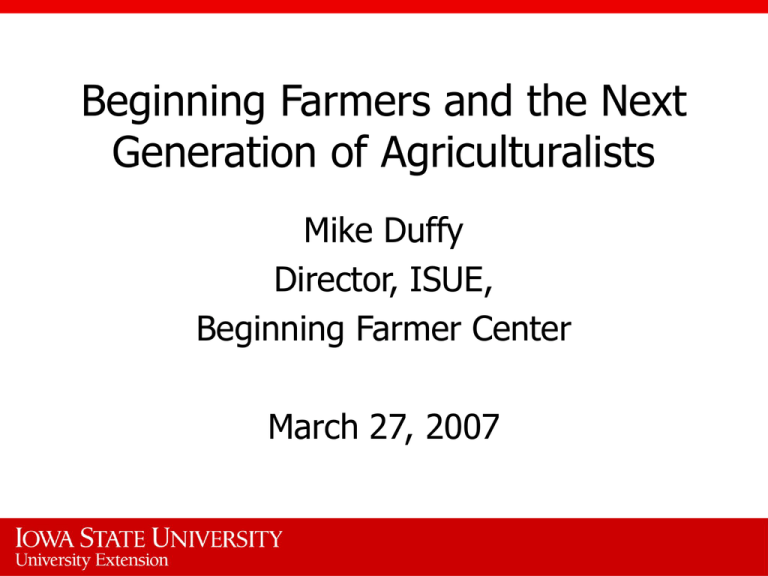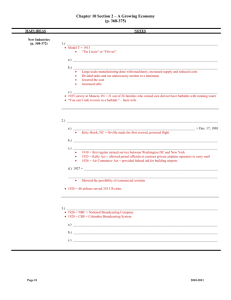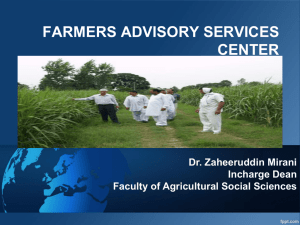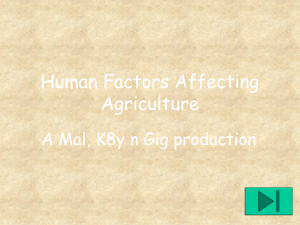Beginning Farmers and the Next Generation of Agriculturalists
advertisement

Beginning Farmers and the Next Generation of Agriculturalists Mike Duffy Director, ISUE, Beginning Farmer Center March 27, 2007 Outline • Overview of the situation • Factors for ANR to consider • Program opportunities Background • Upsurge in interest due to: – Losing farm population in general – Lack of entry into farming – Concern over the loss of population and decline in rural communities – Improving quality of life Percent of Iowa Farmers Over 65 and Under 35 Years Old 25% 20% 15% 10% 5% 0% 1959 1964 1969 1974 1978 < 35 1982 1987 > 65 1992 1997 2002 -30% -40% Farms Sales $5 $2 $1 -20% 00 50 00 $5 $4 $2 $2 $1 .5 to to $9 $4 $3 $2 > $9 99 $4 99 M 99 99 99 99 99 99 99 99 $1 ,9 ,9 ,9 9, 9 9, 9 9, 9 4, 9 $2 49 to to to to 9, 9 9 9 ,9 9 ,9 9 $9 $4 9 0 ,4 9 ,0 0 $2 $1 to to to to 0 0 5 0 0 $5 $2 to $1 -10% $1 < Percent Change in Iowa Farms and Sales by Sales Class, 1997-2002 70% 60% 50% 40% 30% 20% 10% 0% Some Comments • Why worry about beginning farmers - Less labor in farming now so we don’t need as many people - If there is a need for more farmers the market will provide the incentive for them - Most beginning farmers come from rich families and need our help less than others - What about the hardware, grocery and other stores that are going out of business Economic Impacts • Beginning farmers are the next generation – Beginning and retaining farmers should be viewed as economic development for the area; BFC sponsored research shows an additional family will add .44 jobs and an additional $9,400 cash income – Beginning farmers help keep a community vibrant and diverse; activities in schools, civic affairs, churches, and other activities Economic Impacts • Beginning farmers are more likely to try new things, keeping the rural areas dynamic • More opportunities for ancillary activities • Beginning farmers will give retiring farmers more options and alternatives to simply giving up the land • Provide a work force for other businesses Who are Beginning Farmers? • Beginning Farmers - returning to a family farm - starting farming on their own - starting with a non-family member - returning to farming after another career - may be full or part-time Opportunities • At least five choices: 1. Volume; farm with tight margins and make money through volume 2. Widen margins; either through improved cost management or through increasing the value of the output (selling attributes eg, organic, specialty soybeans, high oil corn) Opportunities 3. Production besides traditional commodities, eg., fruits, vegetables, alternative livestock 4. Supplement farm income with other income sources 5. Save money and wait to farm later Opportunities • Multiple generation farming lets you pool resources; older generation with capital and younger generation with labor; both with different views on management • Multiple generation farming allows for risk taking and experimenting • Multiple generation farming gives the new farmers role models and mentors and provides the older farmers with opportunities Opportunities • Alternative production opportunities for specific attributes • Local food movement • Food security concerns • Alternative marketing strategies with internet and other outlets Challenges • Adequate income for all parties involved - each family has to decided what is adequate; depends on goals, situation, and other personal factors - BFC research has shown that farmers who plan to retire expect to receive approximately 25% of their retirement income from the existing farm - Income can come in many forms and from different sources Challenges • Multiple generations - farming and non-farming heirs - treating everyone fairly - communication - conflict resolution - different goals; stages of life Challenges • Planning (Remember these are not the same thing) – Estate planning – Succession planning – Retirement planning – Transfer planning • Finding solutions that match the values, goals and resources Programming • BFC has number presentations and material available and we will help with programming whenever you need. • Need to remember that beginning farmers isn’t always a one size fits all audience; new ideas and approaches needed • Time of day for meetings • Mixed age and stage audiences • Recruiting Programming • Content will need to be geared towards the audience and topic; noncommodity presentations • Some beginning farmers may not have the experience or background we are used to seeing • Remember to include retiring farmers and programming for them Programming • Beginning farmer programs provide unique opportunities for multi-disciplinary approaches, including not just agricultural skills • Beginning farmer programming allows us to cross generations with our work • Beginning farmer programming allows us towork with people who are excited and willing to change and try new things • Beginning farmer programming challenges us to think outside the box and to keep up Iowa State University Extension Beginning Farmer Center • Established 1994 • Provides programming for beginning and retiring farmers • FarmOn program; matching service for unrelated parties • Ag Link program; seminar for beginning farmers and those with whom they will be farming • Consultations • Seminars • Research • National program coordination Available Resources • Federal Farm Service Agency www.fsa.usda.gov/FSA USDA Small farms program • Nonprofits National farm transition network Practical Farmers of Iowa Available Resources • State Iowa Agriculture Development Authority www.iada.state.ia.us Iowa Department of Ag. and Land Stewardship; www.agriculture.state.ia.us/ Available Resources • ISU resources; Beginning Farmer Center www.extension.iastate.edu/bfc Farm Financial Planning Program; www.extension.iastate.edu/farmanalysis Ag. Decision Maker; www.extension.iastate.edu/agdm Ag. Marketing Research Center www.agmrc.org/agmrc BFC Contact Information Iowa State Beginning Farmer Center 1-877-BFC-1999 bfc@iastate.edu www.extension.iastate.edu/bfc





